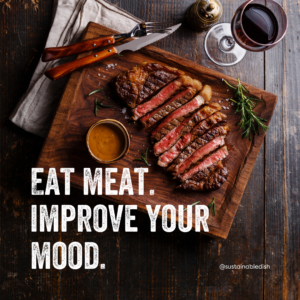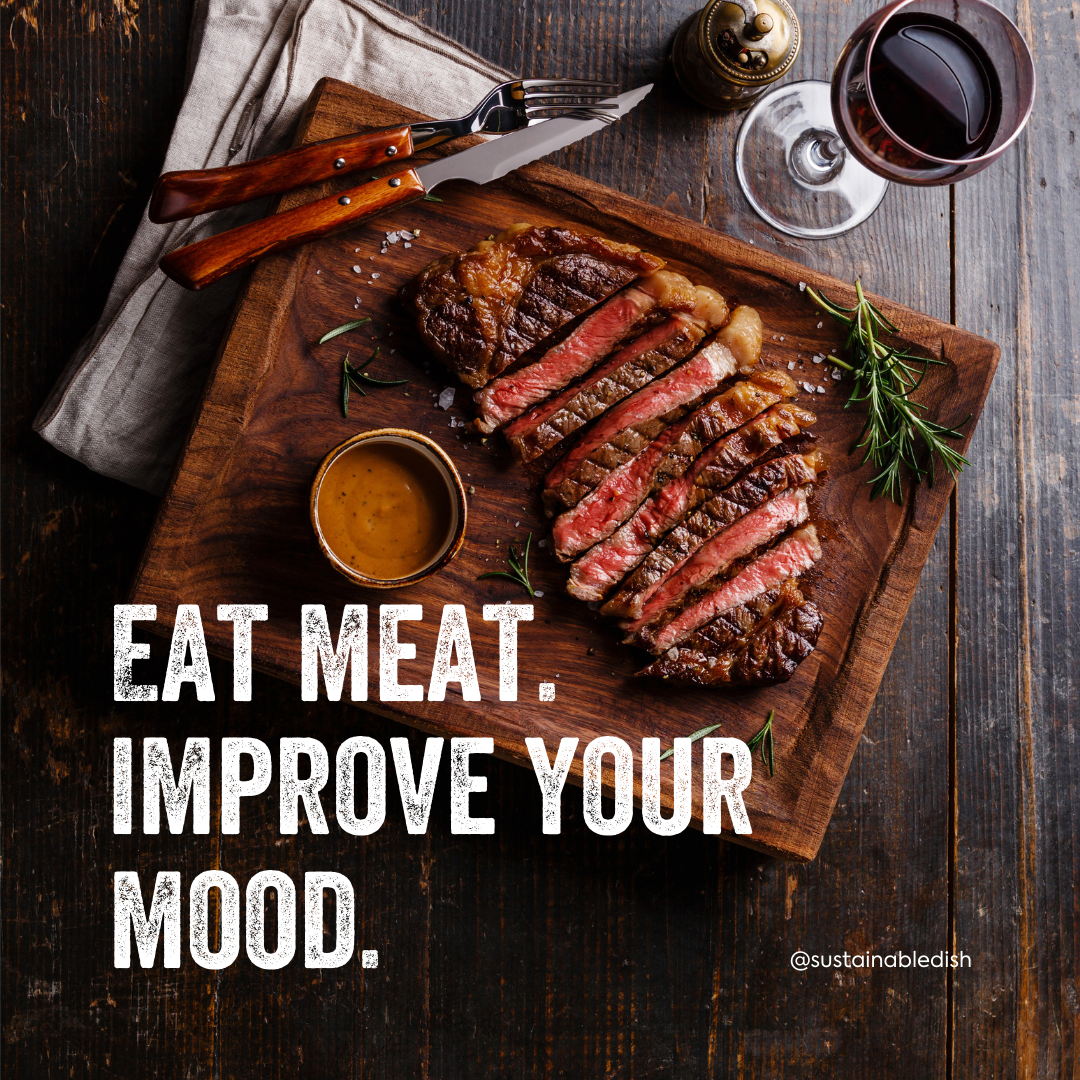 Anxiety and depression are debilitating, but surmounting research is finding that people who eat meat are less depressed.
Anxiety and depression are debilitating, but surmounting research is finding that people who eat meat are less depressed.
Approximately 1 in 5 US adults experiences mental illness in a given year. Depression, in particular, affects 7.1% of the population, and it is one of the leading causes of disability in people ages 15-44. Although all the underlying causes of depression are not fully understood, research is clearly finding a significant connection between food choices and the prevention and treatment of mood disorders, especially depression.
Nutrient Deficiencies and Depression
There are many nutrients that have been implicated in the risk of depression and are frequently assessed during clinical treatment. Particular nutritional deficiencies have been connected to an increased risk of depression. Correction of these deficiencies has been used as a treatment to help improve symptoms. Here are a few of the nutrients that impact mental health:
- Omega-3 fatty acids
- Iron
- Zinc
- Calcium
- Choline
- Vitamin A
- Vitamin D
- Vitamin C
- Vitamin B12
- Vitamin E
- Vitamin K
A 2010 study found that for every 10 additional micrograms of B12 consumed and 10 mg of vitamin B6, risk of depression decreased by 2%. Meat is the best source of these two vitamins. Other studies have connected vitamin D deficiency with an increased risk of depressive disorder. The other nutrients mentioned in this list are critical for optimal brain health, all of them are found in animal products.
Dietary Patterns and Depression
We know that diet is not just made up of individual nutrients. Recent research has started to focus more on dietary patterns and their connection to depression.
A 2017 systemic review of seventeen studies on diet and mental health found a strong connection between a whole foods diet and a decreased risk of depression. The study also found that the dietary interventions which were most effective were more likely to involve a Registered Dietitian that was less likely to recommend limiting meat intake, encourage leaner protein, or promote a low-cholesterol diet.
A 2009 study looked specifically at a Mediterranean dietary pattern and depression. Over 10,000 individuals participated in the study. Participants who adhered the most to a Mediterranean-style diet were 30% less likely to be diagnosed with depression during the 4 year study period. There was an inverse relationship found between depression and intake of fruit, nuts, monounsaturated fats, and legumes.
A 2012 study of 1,000 Australian women found that red meat intake was extremely important for the prevention of depression. Researchers observed women who consumed the least amount of red meat were twice as likely to be diagnosed with depression or anxiety disorder, compared to those who ate the recommended amount. A connection was not found between mental health and other forms of protein, such as chicken, pork, or fish. Even when vegetarian women were removed from the analysis, the results remained, those that ate the least meat were more likely to be diagnosed with depression.
Foods Linked to Depression
Many foods decrease the risk of depression, but what about those that increase the risk?
A 2019 systemic review evaluated the impact of carbohydrate consumption and mood. An analysis of 31 studies found that carbohydrates do not increase mood. Carbohydrate consumption is associated with increased fatigue and decreased alertness within 30 minutes of ingestion.
A 2018 study of almost 10,000 men found that vegetarian and vegan dietary patterns were associated with an increased risk of depression. Another 2018 study of over 90,000 adults found similar results, that depression rates increased with the elimination of meat. The researchers suggested that nutritional deficiencies, particularly in B12 and iron, may contribute to the risk of depression.
Foods for Preventing Depression
A 2018 study analyzed all the foods and nutrients that have been linked to depression to determine an “Antidepressant Food Score” for each food. The highest scoring foods for helping prevent depression were:
- Oysters and shellfish
- Organ meats
- Fish
- Dark, leafy greens like watercress, spinach, lettuce, Swiss chard, herbs, and kale
- Colorful vegetables, like pumpkin, and red peppers
- Cruciferous vegetables
The nutrients of most importance for the prevention and treatment of depression were:
- Folate
- Iron
- Omega-3s (EPA and DHA)
- Magnesium
- Potassium
- Thiamine
- Selenium
- Vitamin A
- Vitamin B6
- Vitamin B12
- Vitamin C
- Zinc
Due to the continuing connection between food and mood, nutritional guidelines for the prevention of depression were published in Nutritional Neuroscience in 2017. The recommendations included following a traditional whole-food diet with adequate omega-3 fats and to avoid processed foods, particularly those high in carbohydrates and sugar.
Although more research is needed in determining the ideal dietary pattern for preventing and managing depression, there are several patterns emerging. Foods high in zinc, iron, omega-3 fatty acids, and vitamin B12 are particularly important for brain function. These nutrients are found in shellfish and organ meats but are also in most animal foods.
Fiber and phytonutrients play a role in mental well-being as well due to the impact they have on the health of the gut microbiome and reduction in oxidative stress. Fruits and vegetables are the best sources of these important nutrients for health.
Research is still evaluating what specific dietary pattern is best for your mood, but the emerging evidence strongly suggests that a whole-food diet rich in both meat and vegetables is key.









12 thoughts on “Eat Meat. Improve your Mood.”
Based on my own N=1 experience, I agree. Based on intuition and commonsense, I agree. But based on science, pretty much all the studies you cited are epidemiological studies with very weak relative risk associations. So you can’t make any real definitive deductions from such weak observational methodologies to confirm your biases. The biochemistry and mechanisms are stronger arguments.
With epi–studies, it seems many reference them when they confirm biases, and then scoff at them when they contradict biases. You really can’t have it both ways. Epi-studies with very weak associations never prove causation one way or the other.
What about those that are allergic to red meat? What would be the best foods to focus on?
Other animal proteins
Was there any association between increased/decreased intake of “white meats” (i.e. chicken, pork, and fish) and depression, or was this association only found for red meat (i.e. beef, lamb, etc…)?
If there’s no association with white meats, then B12 alone is unlikely to be the culprit as pork and chicken also contain a lot of B12.
Chicken has much less B12 than beef.
Pingback: [BLOCKED BY STBV] The Case for Better Meat | Hellbent On Bliss
Pingback: [BLOCKED BY STBV] The Health Benefits of Eating Red Meat | Douglas Willis
A 2012 study published in the journal Appetite found no difference in depression with 486 vegans, vegetarians, semi-vegetarian, and non-vegetarians.
https://foodethics.univie.ac.at/fileadmin/user_upload/p_foodethik/Timko__C.__2012._Will_the_real_vegetarian_please_stand_up.pdf
Researchers from Benedictine University reported that found there were no differences in depression scores among vegans, vegetarians, and omnivores. The meat-eaters had higher anxiety and stress scores than the vegetarians and vegans.
http://www.medicosadventistas.org/wp-content/uploads/2018/09/Vegans-report-less-stress-and-anxiety-than-omnivores.pdf
In a 2010 study published in Nutrition Journal, Arizona State University investigators found that Seventh Day Adventists who were vegetarians had lower depression, anxiety, and stress scores than meat-eating Adventists. https://nutritionj.biomedcentral.com/articles/10.1186/1475-2891-9-26
Other factors, like women being more likely to have depression and also being more likely to be vegetarian or the probability that highly sensitive people are both more likely to become depressed and be compassionate could be at play. Also it is depressing giving up animal products after becoming aware of the extreme cruelty animals face and seeing the rest of society continue to partake and support it.
Meat and mental health: A meta-analysis of meat consumption, depression, and anxiety
Urska Dobersek, Kelsey Teel, Sydney Altmeyer, Joshua Adkins, Gabrielle Wy & Jackson Peak
“In this meta-analysis, we examined the quantitative relation between meat consumption or avoidance, depression, and anxiety. In June 2020, we searched five online databases for primary studies examining differences in depression and anxiety between meat abstainers and meat consumers that offered a clear (dichotomous) distinction between these groups. Twenty studies met the selection criteria representing 171,802 participants with 157,778 meat consumers and 13,259 meat abstainers. We calculated the magnitude of the effect between meat consumers and meat abstainers with bias correction (Hedges’s g effect size) where higher and positive scores reflect better outcomes for meat consumers. Meat consumption was associated with lower depression (Hedges’s g = 0.216, 95% CI [0.14 to 0.30], p < .001) and lower anxiety (g = 0.17, 95% CI [0.03 to 0.31], p = .02) compared to meat abstention. Compared to vegans, meat consumers experienced both lower depression (g = 0.26, 95% CI [0.01 to 0.51], p = .041) and anxiety (g = 0.15, 95% CI [-0.40 to 0.69], p = .598). Sex did not modify these relations. Study quality explained 58% and 76% of between-studies heterogeneity in depression and anxiety, respectively. The analysis also showed that the more rigorous the study, the more positive and consistent the relation between meat consumption and better mental health. The current body of evidence precludes causal and temporal inferences."
https://www.tandfonline.com/doi/full/10.1080/10408398.2021.1974336
I have found a surprising improvement in mood and cognitive function, much less drowsiness and depression after eating venison for one week. I have been on a chicken and fish (mackerel) diet through the summer and Autumn with no problem, however now that winter has set in I feel I need something a bit extra. I live in North Scotland where there is a lack of sunlight, but there must be more to this than a lack of vitamin D from the sun. My guess is that I wasn’t getting enough B vitamins.
I eat grass-fed beef, free-range chicken, and wild caught fish, among a varied diet. I just read in “The Hacking of the American Mind” about serotonin, a necessary brain chemical. Low levels of it cause depression, which is treated by the most used prescription drugs, SSRIs (e.g Prozac). Tryptophan, an amino acid, is absolutely necessary for the body to make serotonin, and it has to be obtained from food. Sources are beef, poultry, eggs, and milk. My tendency to depression has gone away since eating much more of these foods. I think this information should be more widely known. The book is by an endocrinologist and deeply documented.
Wonderful blog! I can attest to the increase in mental and cognitive Health after adopting a animal centred diet! Three years of being plant based left my body nutrient depleted and in a mental fog and I tried very hard to do it right, but supplements just weren’t cutting it.